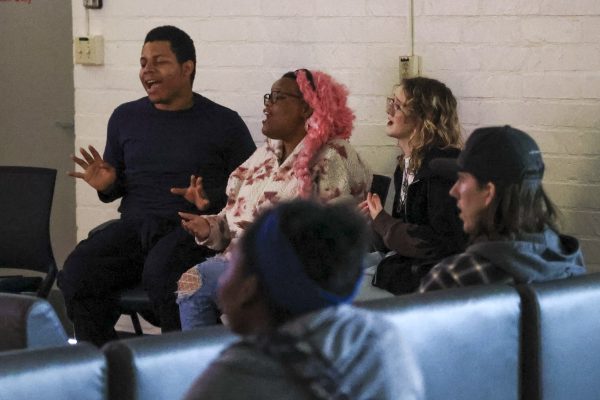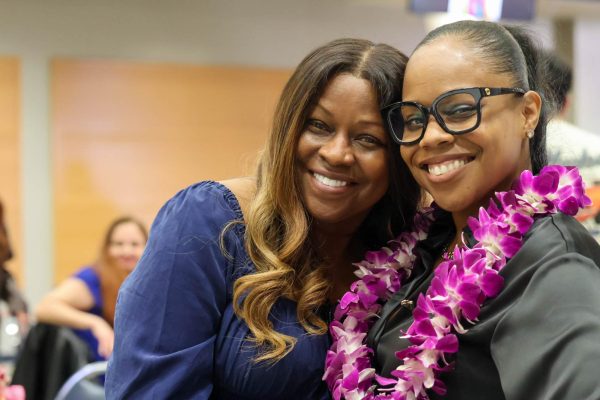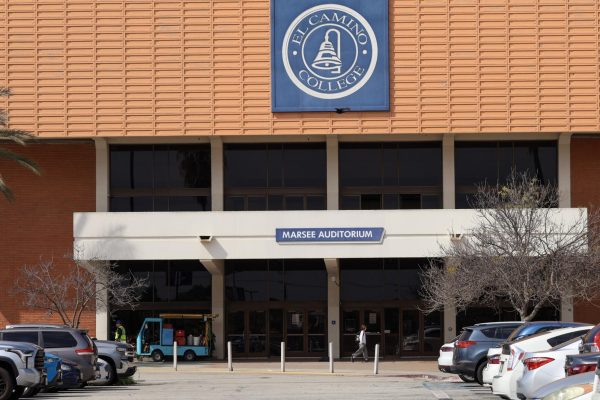SEAC hosts events to address racial microaggression on and off-campus
Hiram Cormier Jr., a 21-year-old political science major at El Camino College, discusses his experience regarding racial microaggression on and off-campus with The Union via Zoom interview on March 20. “I just spoke at a symposium and there’s like a lot of hesitancy with the people who have hired faculty or professors even to change these [racial microagression] situations,” Cormier Jr. said. (Zoha Jan/ The Union) Photo credit: Zoha Jan
While students, both on and off college campuses, have been dealing with racial microaggressions for years, programs like the Student Equity Advisory Council (SEAC) at El Camino College have been hosting panels to try and give a voice to current and former students regarding their own experiences.
Students and faculty members were invited to share their experiences at ECC, how they felt it would be best to deal with racial microaggressions and what actions should be taken to solve these issues.
Hiram Cormier Jr., a 21-year-old political science major at ECC, said he has faced racial microaggressions in an anthropology class because the class was biased with white culture.
“One microaggression that I’ve experienced on El Camino was the stripping away of someone’s identity through Eurocentric lines of teaching,” Cormier said.
Cormier said that not only ECC but the whole American education system neglects history about people of color.
Before COVID-19, he took a sociology class at ECC. The professor told students to add campus police and city police phone numbers to their emergency contacts as a way of keeping them safe.
“These things [seem] small to everybody else but for people who have to go through that, it can wreck your whole life,” Cormier said. “For people who’ve experienced police brutality, like black people and people who’ve been stopped by police.”
Going through classes where he felt less than others was difficult for Cormier, he said there were days he was unable to go to bed or eat due to the tension around him and that many students face similar issues because of a lack of resources.
“The reason is because of history, the stripping away of resources, the deliberate commodification of black bodies through slavery,” Cormier said. ”We weren’t seen as humans, we’re still not seen as humans, we’re assets to be sold and traded.”
Cormier said he has dealt with racial microaggressions by staying positive.
“I guess on the positive side of it [is] knowing that I present a brand as a black man to the system, not because I am a threat, but because the power that’s inside of people who are oppressed is threatening to the system,” Cormier said.
Professors can help students who are facing hardships by leading open discussions about bias and inequality in class. If a student is struggling in school, there may be a bigger issue behind the difficulties.
Melissa Fujiwara, professor of sociology at ECC, has been assisting in various workshops and symposiums around the topic of race and equity this semester and last, and recently coordinated a microaggression panel this semester.
“When I was doing those [workshops], I felt like what was missing were students’ voices,” Fujiwara said. “I wanted to do a panel that centered students’ voices.”
The students discussed their personal stories of facing racial microaggressions, and she wanted to create a space for others to listen to these stories too.
“I don’t think I’m seeing an increase in what students share, because I think that these issues have been there all along,” Fujiwara said. “The incident [that] happened with George Floyd [has] sort of awakened lots of folks to the racial inequities and disparities that are out there.”
She has been working on race and equity since she came to ECC and has a doctorate in the topic. It has been a long-standing issue and, while some were unaware before, there is now a way to spread awareness, Fujiwara said.
“We have to unpack it and examine what’s going on so that we can intervene where necessary,” Fujiwara said. “Talking about it, and centering students’ voices, that’s a huge action.”
Faulty members also experience similar racial microaggressions from other faculty members and students as well, Fujiwara said.
There has been discussion in the Presidents Advisory Committee on Race and Equity to make the faculty more diverse and there is a social justice center opening in ECC, Fujiwara said.
Center director of Black Cultural and Student Affairs at the University of Southern California, Greeley Harris, has not noticed an increase in racial discrimination. However, he said that due to the usage of social media, people are more aware of racism in society.
“I think students have a voice and they have power,” Harris said. “[We should be] encouraging our students to [utilize] their voice and the power that they have to make positive change.”
The Center for Black Cultural and Student Affairs at USC started through student advocacy in 1977. The students wanted a space where they could feel a part of the community and these centers were a way to empower them.
“There’s power in advocacy, there’s power in students using their voice and getting together and to hold themselves accountable, but also to hold the administration accountable and to hold departments accountable,” Harris said.
ECC has been taking action towards giving voices to students. On March 3. Students Equity and Achievement created a panel facilitated by Fujiwara. Three panelists spoke about their experiences regarding racial microaggression.
“I would also encourage us to tap into our communities, wherever we live at, try to find people you think you can trust, or pull your resources with other students,” Cormier said.
Editor’s note: A phrase was added to the first paragraph for clarity.


![Hiram Cormier Jr., a 21-year-old political science major at El Camino College, discusses his experience regarding racial microaggression on and off-campus with The Union via Zoom interview on March 20. “I just spoke at a symposium and there's like a lot of hesitancy with the people who have hired faculty or professors even to change these [racial microagression] situations,” Cormier Jr. said. (Zoha Jan/ The Union) Photo credit: Zoha Jan](https://eccunion.com/wp-content/uploads/2021/03/racial-microagression-interview-900x495.png)



![Physics and astronomy professor Susan Stolovy presents astronomical news and updates to attendees at the first planetarium show of the semester at El Camino College on Friday, March 28. Prior to becoming a professor at ECC, Stolovy completed her doctorate in physics and worked as an astrophysicist for NASA and the California Institute of Technology on spacecraft missions. "[I'm] still very tuned into what's going on in the world of research as well, and I hope to bring a little bit of my experience into the classroom," Stolovy said. (Nikki Yunker | The Union)](https://eccunion.com/wp-content/uploads/2025/03/planetarium-Made-with-Clipchamp-3-frame-at-0m28s-600x338.jpg)
